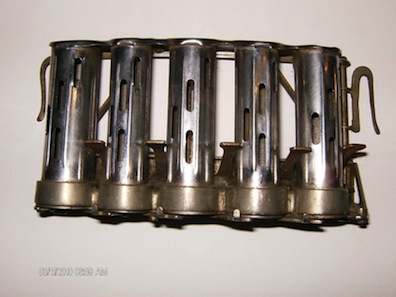"Turning his little savingsbox about
in his hand," Mr. Deasy tells Stephen, "These are handy things
to have....You just buy one of these machines. You'll find
them very handy." Trolley conductors of the time made change
with barrel-and-lever devices that could be clipped to a belt,
but they could hardly be called boxes or turned about in one's
hand. Joyce is more likely referring to a device that could be
carried in a pocket, such as the one shown in the first two
photographs here.
In a personal communication, Nariman Tavakoli has called my
attention to this vintage machine offered for sale on the Etsy
website. Made in Germany in the first decades of the 20th
century, the spring-loaded device features slots around the
sides where coins can be inserted and ejected. It has
compartments for five denominations of old U.K. currency, as Mr. Deasy's
does—"See. This is for sovereigns. This is for shillings.
Sixpences, halfcrowns. And here crowns"—but it holds a
slightly different mix (threepences, sixpences, shillings,
two-shillings, and half-crowns). The narrative describes Mr.
Deasy not only turning his coin-holder about in his hand, but
later tapping it "against his thumbnail," so
Joyce must be thinking of some small pocket box of this sort,
rather than a barrel-and-lever device like the American model
shown in the third photograph.
Deasy advises Stephen to go buy a coin-sorting machine rather
than scooping up his pay and dumping it all in a pants'
pocket: "You'll pull it out somewhere and lose it." Stephen
brushes off his moneyed employer's advice, but Deasy does have
a point. In Eumaeus, when Corley accosts a ferociously
inebriated Stephen in the street and pleads poverty, Stephen
reaches into a pocket "thinking he might lend him anything up
to a bob or so," and finds "what he surmised in the dark
were pennies, erroneously however, as it turned out. / — Those
are halfcrowns, man, Corley corrected him." Intending to
give Corley anything up to a shilling (12 pence), and pulling
out what he thinks are pennies, he instead finds himself
holding half-crowns (coins worth 2 shillings 6 pence, or 30
times more than a penny) and gives Corley one of them.


